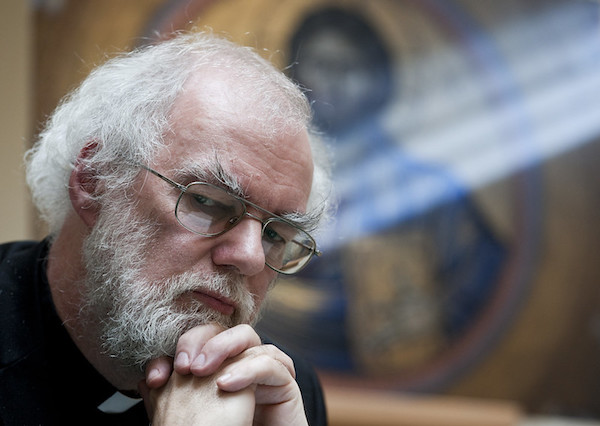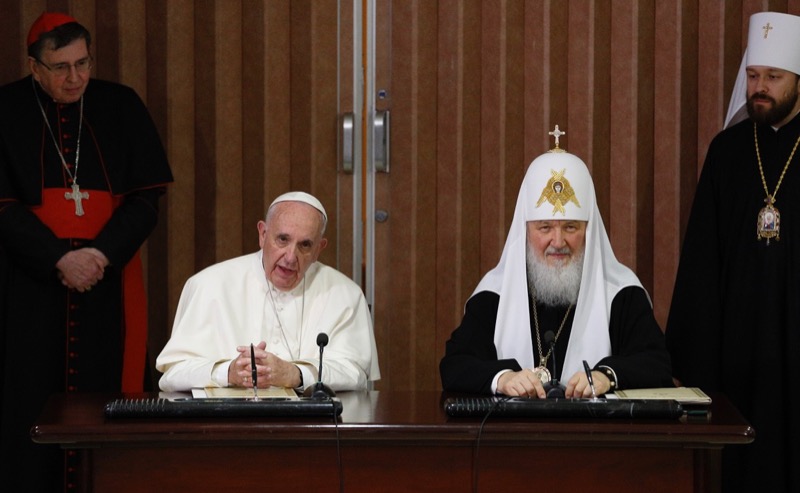Vatican diplomats have voiced opposition to proposals to ban the Russian Orthodox Church in Ukraine, as the Holy See explores the possibility of a meeting between the Pope and Patriarch Kirill of Moscow.
In a statement on Monday, the apostolic nunciature in Ukraine said that it “noted the existence of public discussions concerning certain Churches, their legal recognition and the respective use of property”.
This referred to a draft bill, submitted to the Ukrainian parliament on 29 March, which would ban the Moscow patriarchate from the territory and require all churches and religious organisations under its jurisdiction to change their allegiance within 14 days. All property of the Russian Orthodox Church in Ukraine would be nationalised.
Hostility towards the Moscow patriarchate is growing in Ukraine, where recent polling found that half of Ukrainians wanted it banned from the country.
The nunciature’s statement asserts “that the Holy See is opposed to any restrictive action taken against any Church or religious organisation, in any country and in any situation”.
While decrying the invasion of Ukraine and denying Russian claims of a “just war”, Pope Francis has not yet explicitly condemned the Russian government, and could yet act as a mediator. It was reported on Monday that the Vatican was considering a meeting between him and Patriarch Kirill in the summer.
Reuters said that sources had disclosed draft plans to extend the Pope’s visit to the Middle East in June, with a helicopter taking him to Jerusalem to meet the patriarch.
During his flight back to Rome from Malta earlier this month, Pope Francis told reporters that both a meeting with Kirill and a visit to Kyiv were possibilities. Last week the Vatican’s Secretary of State, Cardinal Pietro Parolin, said that a trip to Ukraine could be arranged, but depended on “whether it would really contribute to the ending of the war”.
He emphasised that “the Pope would not go to take a position either in favour of one side or the other”, and it is understood that no such visit would take place unless there could also be a meeting with Kirill.
The Vatican has continued its efforts to intercede with Kirill despite the patriarch’s persistent refusal to condemn Russia’s invasion or withdraw his blessing from its armed forces, which has prompted outrage and dissent among Orthodox Christians in Ukraine still formally under his jurisdiction.
There has also been disquiet at the Pope’s plan for Ukrainian and Russian families to participate jointly in the Stations of the Cross in Rome.
Major Archbishop Sviatoslav Shevchuk of the Ukrainian Greek Catholic Church described the proposal as “untimely, ambiguous, and such that it does not take into account the context of Russia’s military aggression against Ukraine”.
The published plans for the Via Crucis at the Colosseum on Good Friday include Russian and Ukrainian families carrying a cross together for the thirteenth station, and reading a joint reflection which asks: “Why has my land become as dark as Golgotha? We have no tears left. Anger has given way to resignation.”
A statement issued by Major Archbishop Shevchuk’s secretariat in Rome called this “incoherent and even offensive”, while Ukraine’s newly-appointed ambassador to the Holy See also expressed concern at the plan.
Ambassador Andrii Yurash, who presented his credentials to Pope Francis last week, said in a social media post that he “understands and shares general concerns” with the plan and was “working on the issue trying to explain difficulties of its realisation and possible consequences”.



 Loading ...
Loading ...